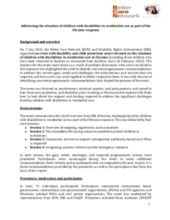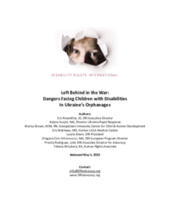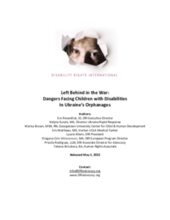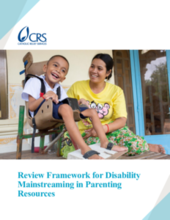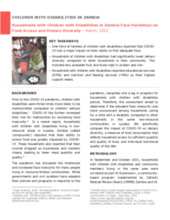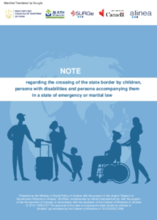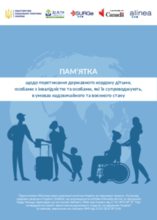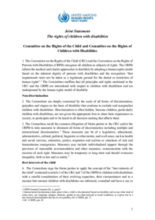Displaying 71 - 80 of 499
On 7 July 2022, the Better Care Network (BCN) and Disability Rights International (DRI) organised an event with disability and child protection actors focused on the situation of children with disabilities in residential care in Ukraine (including those children who have been returned to families or evacuated from facilities since 24 February 2022).
There were an estimated 100,000 children in Ukraine’s institutions before Russia’s war on Ukraine which began in February 2022.
Disability Rights International (DRI) published these recommendations in response to a visit to Ukraine’s institutions for children with disabilities in late April 2022. DRI visited three facilities for children aged six to adult, and one “baby” home for children from birth to age six.
DRI found that Ukraine’s children with disabilities with the greatest support needs are living in atrocious conditions – entirely overlooked by major international relief agencies and receiving little support from abroad.
This Framework for Disability Mainstreaming in Parenting Resources is a tool to help organizations and practitioners to review existing parenting resources in terms of information and content gaps, limitations of instructional guidance, and at-home activities. The aim of the framework is to ensure parenting resources are inclusive of the needs of parents of children with disabilities ages 0 to 17 years.
This video explains the implementation of the UN Convention on the Rights of Persons with Disabilities in the European Union. The Committee is checking if the EU made progress in the implementation of the UN Convention on the Rights of Persons with Disabilities since 2015. The European Network on on Independent Living (ENIL) submitted a shadow report to the Committee. This video explains what you can find in ENIL's shadow report.
This video explains the implementation of the UN Convention on the Rights of Persons with Disabilities in the European Union. The Committee is checking if the EU made progress in the implementation of the UN Convention on the Rights of Persons with Disabilities since 2015. The European Network on on Independent Living (ENIL) submitted a shadow report to the Committee. This video explains what you can find in ENIL's shadow report.
This summary report by Catholic Medical Mission Board (CMMB) Zambia and St Catherine's University reports the impact of COVID-19 on the ability of families of children with disabilities to access adequate food. These households named educational and nutritional services as their most pressing support needs.
This handbook was prepared by the Ministry of Social Policy of Ukraine with the support of the project "Support to Government Reforms in Ukraine" (SURGe), in accordance with the resolution of the Cabinet of Ministers of Ukraine of 27.01.1995 No. 57 "On approval of the rules of crossing the state border by citizens of Ukraine" (as amended by the Cabinet of Ministers of 12.03.2022 No. 264). It outlines practical guidelines for Ukraine citizens when crossing the State border of Ukraine.
Цей запис підготовлено Міністерством соціальної політики України за підтримки проекту «Підтримка державних реформ в Україні» (SURGe), відповідно до постанови Кабінету Міністрів України від 27.01.1995 р. № 57». Про затвердження Правил перетину державного кордону громадянами України» (в редакції постанови КМУ від 12.03.2022 р. № 264). У ньому викладено практичні рекомендації для громадян України при перетині державного кордону України.
In a joint statement published 18 March 2022, the Committee on the Rights of the Child and the Committee on the Rights of Children with Disabilities expressed deep concern about the institutionalisation of children with disabilities and called on States Parties to end institutionalisation on the basis of disability and to promote the development of support for children in a family in the community.

